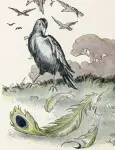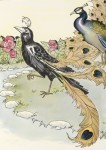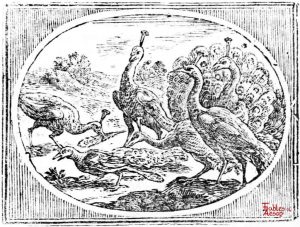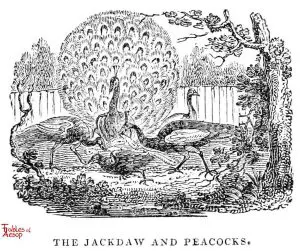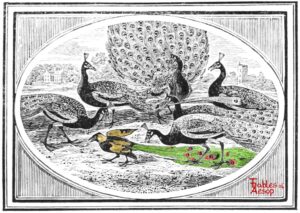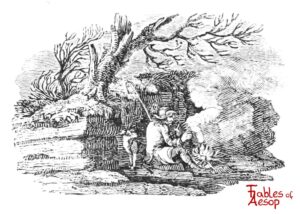A fine bird is more than fine feathers. A Jackdaw tried to make itself look pretty using peacock feathers. It had to flee when found out. What a rout.
A fine bird is more than fine feathers
A Jackdaw found a number of feathers which had fallen from Peacocks when they were moulting. He tied them to his tail and strutted towards the Peacocks. When he came near them they discovered the cheat, and plucked away his borrowed plumes. The Jackdaw could do no better than go back to his companions, who had watched his behaviour from a distance; but they were equally annoyed with him for the deception.

Aesop For Children (The Vain Jackdaw and His Borrowed Feathers)
A Jackdaw chanced to fly over the garden of the King’s palace. There he saw with much wonder and envy a flock of royal Peacocks in all the glory of their splendid plumage.
Now the black Jackdaw was not a very handsome bird, nor very refined in manner. Yet he imagined that all he needed to make himself fit for the society of the Peacocks was a dress like theirs. So he picked up some castoff feathers of the Peacocks and stuck them among his own black plumes.
Dressed in his borrowed finery he strutted loftily among the birds of his own kind. Then he flew down into the garden among the Peacocks. But they soon saw who he was. Angry at the cheat, they flew at him, plucking away the borrowed feathers and also some of his own.
The poor Jackdaw returned sadly to his former companions. There another unpleasant surprise awaited him. They had not forgotten his superior airs toward them, and, to punish him, they drove him away with a rain of pecks and jeers.
Moral
Borrowed feathers do not make fine birds.

Eliot/Jacobs Version
A Jay venturing into a yard where Peacocks used to walk, found there a number of feathers which had fallen from the Peacocks when they were moulting. He tied them all to his tail and strutted down towards the Peacocks. When he came near them they soon discovered the cheat, and striding up to him pecked at him and plucked away his borrowed plumes. So the Jay could do no better than go back to the other Jays, who had watched his behaviour from a distance; but they were equally annoyed with him, and told him: “It is not only fine feathers that make fine birds.”

JBR Collection
A Jackdaw having dressed himself in feathers which had fallen from some Peacocks, strutted about in the company of these birds, and tried to pass himself off as one of them. They soon found him out, and pulled their feathers from him so roughly, and in other ways so battered him, that when he would have rejoined his fellows, they, in their turn, would have nothing to do with him, and drove him from their society.

Townsend version (The Vain Jackdaw) – Not a perfect match
Jupiter determined, it is said, to create a sovereign over the birds, and made proclamation that on a certain day they should all present themselves before him, when he would himself choose the most beautiful among them to be king. The Jackdaw, knowing his own ugliness, searched through the woods and fields, and collected the feathers which had fallen from the wings of his companions, and stuck them in all parts of his body, hoping thereby to make himself the most beautiful of all. When the appointed day arrived, and the birds had assembled before Jupiter, the Jackdaw also made his appearance in his many feathered finery. But when Jupiter proposed to make him king because of the beauty of his plumage, the birds indignantly protested, and each plucked from him his own feathers, leaving the Jackdaw nothing but a Jackdaw.

Samuel Croxall (The vain Jack-daw)
A CERTAIN Jack-Daw was so proud and ambitious, that, not contented to live within his own sphere, he picked up the feathers which fell from the Peacocks, stuck them among his own, and very confidently introduced himself into an assembly of those beautiful birds. They soon found him out, stripped him of his borrowed plumes, and falling upon him with their sharp bills, punished him as his presumption deserved. Upon this, full of grief and affliction, he returned to his old companions, and would have flocked with them again; but they, knowing his late life and conversation, industriously avoided him, and refused to admit him into their company; and one of them, at the same time, gave him this serious reproof. If, friend, you could have been contented with your station, and had not disdained the rank in which nature had placed you, you had not been used so scurvily by those upon whom you introduced yourself, nor suffered the notorious slight which we now think ourselves obliged to put upon you.
THE APPLICATION
What we may learn from this fable is, in the main, to live contentedly in our own condition, whatever it be, without affecting to look bigger than we are, by a false or borrowed light. To be barely pleased with appearing above what a man really is, is bad enough; and what may justly render him contemptible in the eyes of his equals: But if, to enable him to do this with something of a better grace, he has clandestinely feathered his nest with his neighbour’s good, when found out, he has nothing to expect but to be stripped of his plunder, and used like a felonious rogue into the bargain.

Thomas Bewick (The Vain Jack-Daw)
A certain Jack-daw was so proud and ambitious, that, not contented to live within his own sphere, he picked up the feathers which fell from the Peacocks, stuck them in among his own, and very confidently introduced himself into an assembly of those beautiful birds. They soon found him out, stripped him of his borrowed plumes, and falling upon him with their sharp bills, punished him as his presumption deserved. Upon this, full of grief and affliction, he returned to his old companions, and would have lived with them again; but they, knowing his late life and conversation, industriously avoided him, and refused to admit him into their company; and one of them, at the same time, gave him this serious reproof: If, friend, you could have been contented with our station, and had not disdained the rank in which nature had placed you, you had not been used so scurvily by those upon whom you intruded yourself, nor suffered the notorious slight which now we think ourselves obliged to put upon you.
APPLICATION.
To aim at making a figure by the means of either borrowed wit, or borrowed money, generally subjects us at last to a ten-fold ridicule. A wise man, therefore, will take his post quietly, in his own station, without pretending to fill that of another, and never affect to look bigger than he really is, by means of a false or borrowed light. It shews great weakness and vanity in any man to be pleased at making an appearance above what he really is; but if to enable him to do so with something of a better grace, he has clandestinely feathered his nest out of his neighbour’s goods, it is a pity if he should not be found out, stripped of his plunder, and treated like a felonious rogue into the bargain.

L’Estrange version
A Daw that had a mind to be sparkish, trick’d himself up with all the gay-feathers he could muster together; and upon the credit of these stoll’n, or borrowed ornaments, he valu’d himself above all the birds in the air beside. The pride of this vanity got him the envy of all his companions, who, upon a discovery of the truth of the case, fell to pluming of him by consent; and when every bird had taken his own feather; the silly daw had nothing left him to cover his nakedness.
Moral
We steal from one another all manner of ways, and to all manner of purposes; wit, as well as feathers; but where pride and beggery meet, people are sure to be made ridiculous in the conclusion.

Crane Poetry Visual
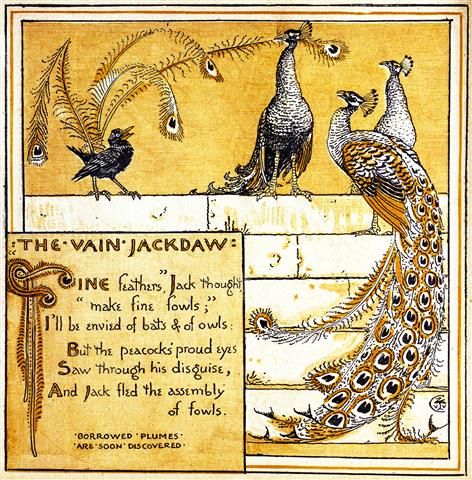
“Fine feathers.” Jack thought, “make fine fowls;”
I’ll be envied of bats & of owls:
But the peacocks’ proud eyes
Saw through his disguise,
And Jack fled the assembly of fowls.
Borrowed plumes are soon discovered.

Graculus et Pavones
Graculus aliquando pennis quae pavoni exciderant se ornaverat. Contemnit nunc suos seque immiscet pavonum gregi. Hi autem impudenti avi pennas rostris eripiunt et fugant. Tum graculus tristis ad suum genus revertitur. Sed ab hoc quoque repellitur, atque unus ex iis quos prius contempserat dixit, “Si contentus fuisses sedibus nostris, illam contumeliam expertus non esses.”
Perry #472
